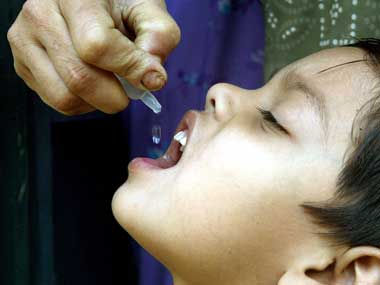The World Health Organisation is set to officially declare India a polio free nation as no polio cases have been detected in the country for the past three years. In a press release, the World Health Organisation noted, though India was once recognised as the world’s epicentre of polio, the country now appears to have interrupted wild poliovirus transmission. “If all pending laboratory investigations return negative, in the coming weeks India will officially be deemed to have stopped indigenous transmission of wild poliovirus,” it noted. [caption id=“attachment_1111437” align=“alignright” width=“380”]  Representational image. Reuters[/caption] “India’s success is arguably its greatest public health achievement and has provided a global opportunity to push for the end of polio,” said WHO Director-General Margaret Chan. The last polio case reported in India was of a 2-year-old girl in the state of West Bengal, on 13 January 2011. Once the WHO declares India as a polio free nation, the number of polio-endemic countries, those which have never stopped indigenous wild poliovirus transmission, will then be reduced to a historical low of three: Afghanistan, Nigeria and Pakistan. However, WHO noted that India must maintain sensitive surveillance and high childhood immunity against wild poliovirus to guard against any importation of polio until eradication is achieved globally. In 2011, Afghanistan and Pakistan have both seen alarming increases in polio cases, and poliovirus from Pakistan re-infected China (which had been polio-free since 1999). In Africa, active polio transmission continues in Chad, the Democratic Republic of the Congo and Nigeria, with outbreaks in West and Central Africa in the past 12 months reminding the world that as long as polio exists anywhere, it remains a threat everywhere. “The scale of the eradication effort in India is mind-boggling,” notes the report. The key to India’s remarkable progress in the fight against polio according to UNICEF Executive Director Anthony Lake, has been the strong leadership of the Government of India and state governments, which launched a comprehensive polio eradication programme that has enabled sustained high immunization coverage in states like Uttar Pradesh and Bihar with high rates of poverty, high population density and poor sanitation and infrastructure, conditions in which disease like polio can thrive. Each year, more than 170 million children under the age of 5 are vaccinated in two national immunization campaigns, with up to 70 million children in the highest-risk areas vaccinated multiple times in additional special campaigns; the whole effort requires nearly a billion doses of oral polio vaccine annually. While polio has been eradicated, India still tops the world’s list for child mortality and millions of children die in completely preventable conditions, like diarrhoea, and pneumonia. Hopefully the government will be able to fight these conditions as it overcame the demon of polio.
The World Health Organisation is set to officially declare India a polio free nation as no polio cases have been detected in the country for the past three years.
Advertisement
End of Article


)
)
)
)
)
)
)
)
)



